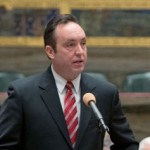Posts
Governor Tom Corbett on a Pa Correctional System Hearing
/in Ask the Governor, Media, News, Video /by PAMattersGovernor Tom Corbett on Medicaid Expansion in PA
/in Ask the Governor, Media, News, Video /by PAMattersGovernor Tom Corbett on the Future of Property Tax Reform in PA
/in Ask the Governor, Media, News, Video /by PAMattersPA Senate Passes Three Good Government Bills
/in News /by PAMattersA trio of good government bills went before the state Senate, Wednesday, and all three were approved unanimously. The highest-profile measure would allow for online voter registration, making Pennsylvania the 17th state to offer the option. “For the health of democracy, elections should be run as smoothly as possible,” ACLU of Pennsylvania legislative director Andy Hoover said in a statement. “Online registration can make the process more precise. That leads to less delay and fewer problems on Election Day.”
The other two bills are designed to promote government transparency by requiring lobbying disclosure information and campaign finance data to be filed electronically. Senate Republican leader Dominic Pileggi (R-Delaware), the prime sponsor of the campaign finance bill, says the move is designed to increase timeliness, accuracy and transparency.
State Senator Rob Teplitz (R-Dauphin), who co-chairs the bipartisan, bicameral Reform Caucus, spoke out in favor of all three bills. “That’s what all of our constituents I believe want to see us doing – is creating openness, transparency, more accountability in government, more access to be able to vote,” Teplitz said on the Senate floor.
All three measures require House approval before they can be sent to the governor’s desk.
A Renewed Push for Reform in Harrisburg
/in News /by PAMattersA new package of reform legislation has been introduced at the state capitol, on the heels of the formation of a bipartisan, bicameral reform caucus.
If the goal is to be as transparent as possible, Republican state Senator John Eichelberger (R-Blair) says there’s no reason not to pass the nine bills unveiled on Monday. “We have a bigger push now than we’ve had since I’ve been here, six years,” Eichelberger said at a news conference in the capitol rotunda. “It’s a pretty substantial push.”
One of the nine bills would require public officials to disclose all gifts that exceed $50 in value, compared to the current $250 threshold. Another bill would expressly prohibit a governor or a member of the governor’s administration from accepting gifts from anyone who does business with the commonwealth.
Senator Mike Stack (D-Philadelphia), who’s leading this latest reform push alongside Eichelberger, believes the state capitol still has problems with its public image. “Too often our current laws allow for the appearance, at least, of cozy relationships between special interests,” Stack says. “It’s dispiriting and it erodes the public faith in what we’re trying to do here.”
Stack acknowledges that the nine bills unveiled on Monday do not represent an exhaustive list of government reforms, but he believes they represent a good first step.
Small Group of Reps Renews Push to End COLAs
/in News /by PAMattersA small group of state lawmakers is renewing the push to eliminate public officials’ annual cost-of-living adjustments, commonly referred to as COLAs. Every year lawmakers and a variety of other public officials receive a pay raise that’s tied to the consumer price index, but first-term state Rep. Patty Kim (D-Dauphin) says it’s time for the General Assembly to lead by example.
“There’s about a $1,700 dollar increase every year for a salary that is above average for the family median and it’s unnecessary,” says Kim, “and I think it would just be a great message – along with savings – to cut it out, build the trust back and save money.”
Rank-and-file lawmakers will earn $83,800 this year.
Kim and 2nd term state Rep. Gerald Mullery (D-Luzerne) are leading the charge this session. So far, seven of 203 House members have signed onto their bill. Only three members signed onto an identical bill last session, which died in the House State Government Committee.
Some lawmaker and Corbett administration officials already donate their COLAs to charity or return them to the commonwealth, but eliminating the annual pay raises would ensure the money stays in the public treasury and prevent it from counting toward officials’ pensions.
Turnpike CEO Directs New Accountability Measures
/in News /by PAMattersThe head of the Pennsylvania Turnpike says the commission is making a clean break from any past offenses. After reading the grand jury presentment that led to criminal charges being filed in a “pay-to-play” corruption scheme, CEO Mark Compton tells Radio PA that his emotions went from disappointment to outrage.
“The one thing that I can assure our traveling public, to them and to our employees, both of you deserve better and we are going to make darn sure that these things never happen again.”
On Monday Compton ordered the Office of Compliance to conduct a review of every contract awarded during the timeframe of the Attorney General’s investigation and called for a memo to be sent out to Turnpike vendors, explaining the commission’s revised procurement policies. Compton’s also asking that all Turnpike employees sign their existing code of conduct.
This is all coming less than two months on the job for Compton, who is taking action to ensure past mistakes aren’t repeated again.
The new accountability directives at the Turnpike are in addition to the reforms Compton pointed out in a statement released immediately following last week’s grand jury presentment.
Governance Discussion to Include All State-Relateds
/in News /by PAMattersFormer Auditor General Jack Wagner’s special report on Penn State’s governance will be the subject of a state Senate committee hearing later this month. “It will be a look at whether there should be changes, and then whether the legislature should have a role in that,” says State Government Committee Chairman Lloyd Smucker (R-Lancaster), who adds that the talks will eventually be broadened to include the other three state related universities as well.
Smucker, who is also a member of the Appropriations Committee, got the ball rolling with a few questions for the universities’ leaders this week.
Penn State President Rodney Erickson says their committee on governance & long-range planning will offer some suggested changes to the Board of Trustees later this month. “Much has already changed with the structure and operations of the board, and there’s surely more to come.”
None of the leaders of PSU, Lincoln and the University of Pittsburgh expressed concern over one possible reform, which would remove the president’s voting powers on their respective boards. Temple’s president did not offer an opinion because he’s only been on the job two months, and hasn’t even attended his first trustees’ meeting.
University of Pittsburgh Chancellor Mark Nordenberg did weigh in on another big recommendation in Jack Wagner’s Penn State report – reducing the size of the board. “I don’t know how a small board could exercise proper oversight over an institution the size of Penn State or Pitt or Temple, unless they were going to be full-time board members,” says Nordenberg, noting that smaller is not always better.
Penn State’s Board of Trustees has 32-members. Pitt’s board has 36-voting members; Temple’s has 36-voting members; and Lincoln’s has 39. For reference, Ohio State’s board has 19-members (2-non-voting). The University of Michigan has 9-board members (1-non-voting).
No Easy Answers to Public Pension Woes
/in News /by PAMattersRegardless of any additional reforms, executives from the state’s two big public pension funds are telling state lawmakers that adequate employer contributions are essential. In this case, the state is the employer and its taxpayers are the ones footing the bill.
As it stands, the combined unfunded liabilities of the State Employees’ Retirement System (SERS) and Public School Employees Retirement System (PSERS) are north of $40-billion dollars and climbing. The reasons are many: the 2008 market crash, a lost decade in which the state opted to defer its pension contributions, and a 2001 law that padded pension benefits – especially for lawmakers themselves.
Governor Tom Corbett is proposing a series of long-term pension reforms in hopes of reducing the short-term burden on the state, and PSERS executive director Jeffrey Clay was peppered with questions during House and Senate budget hearings on Wednesday.
“If you’re basically asking the question, “can we get to solvency under Act 120?” the answer would be – from the pension system perspective – yes. The question is whether the state and the school districts can actually afford that,” Clay explains.
Act 120 of 2010 helped to smooth out the pension spike by reducing the benefits of future state employees and teachers, increasing the retirement age and extending the vesting period. Even with those reforms being imposed for all new hires, the state’s $1.5-billion dollar pension obligation this year is expected to climb to $4.3-billion by FY2016/17.
“The policy question for all of us sitting here is, “what are we willing to pay every year?”” said Senate Appropriations Chairman Jake Corman. As lawmakers are finding out, that’s a question without an easy answer.
When addressing the issue of switching new hires to a 401(k)-style ‘defined contribution’ plan, the funds’ executives say any system will work as long as it is well-structured and well-funded.
But critics say that sort of switchover ignores the diminished rate of return for the defined-benefit plans that would still be paying out benefits for decades to come. “Policymakers should ask the Corbett administration how much will be lost in investment earnings with pension restructuring and how much taxpayers will be on the hook when that happens,” says Keystone Research Center executive director Stephen Herzenberg.
The Corbett administration is banking on $175-million dollars in savings for the state, next year alone, through pension reforms. They say PA’s 500 school districts would be able to save another $138-million.
Welcome to PAMatters.com, a new source for news and commentary from Pennsylvania’s capital. In addition to video, audio and pictures from the stories and events that affect YOU, you’ll also get some behind-the-scenes analysis via blogs from our award-winning staff of journalists.








